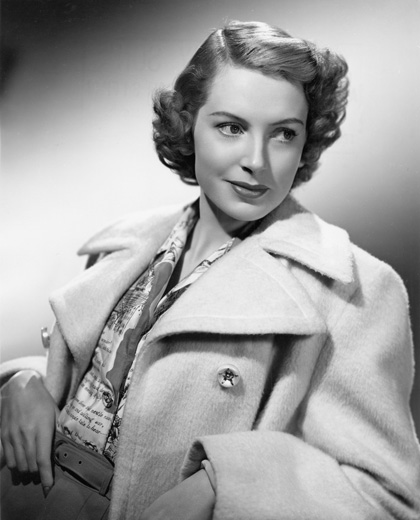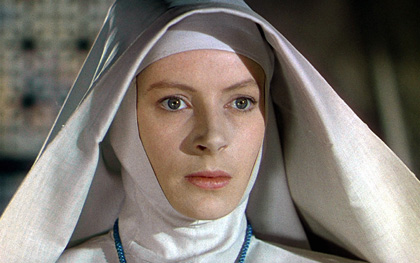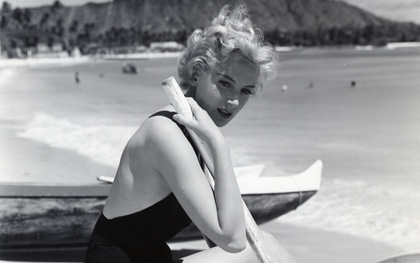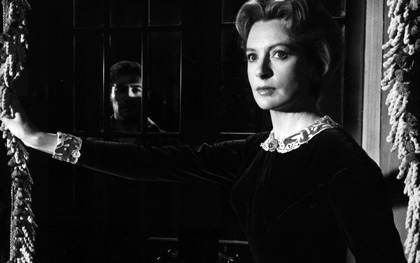Profile
Deborah Kerr

Discovered by Michael Powell, Deborah Kerr essayed an extraordinary range of roles from here to Hollywood, says Quentin Falk
It is said that Deborah Kerr received one of the longest and most heartfelt standing ovations ever in American Academy history when in 1994 at the age of 72 she was awarded an Honorary Oscar.
This may have had something to do with the fact that until that evening she held the unenviable record of six nominations for Best Actress without ever actually picking up the statuette.
The citation read: “An artist of impeccable grace and beauty, a dedicated actress whose motion picture career has always stood for perfection, discipline and elegance”, which almost perfectly encapsulates a screen career that spanned five decades and nearly 50 films.
To that list of her attributes should also perhaps be added ‘versatility’ because just the merest scan of her credits suggests an extraordinary range of roles – from the uptight nun in Powell and Pressburger’s seething Black Narcissus (1947) to a nympho wife in From Here to Eternity (1953), from the guilt-ridden spouse in The End of the Affair (1954) to a lovable governess in the Rodgers & Hammerstein musical The King and I (1956).
Born in Scotland and first trained as a dancer, she made her film debut aged 18 as the Salvation Army girl Jenny Hill in Gabriel Pascal’s charming version of Shaw’s Major Barbara (1941). She'd previously shot another film – Powell and Pressburger’s wartime thriller Contraband (1941), playing a cigarette girl in a nightclub – only to end up as the proverbial face on the cutting-room floor.
“All lovely liquid eyes and nice long legs,” Powell would describe Kerr in his autobiography, also recording how director and actress had had a brief affair during the making of The Archers’ The Life and Death of Colonel Blimp (1943). Just two years on from her false start in Contraband, the 20-year-old was replacing an established star (Wendy Hiller, nine years her senior, who had to withdraw from the film when she became pregnant) as the films female lead – or ‘leads’ – as a trio of sweethearts of varying ages to Roger Livesey’s eponymous British army officer, in a story spanning more than half a century.
The film made her a star and, naturally, a target for Hollywood: MGM bought up her contract from Pascal for a reputed $250,000. The ‘slave’ deal was typical of the period: seven years, 52 weeks a year. There was one untypically generous extra clause: she wasn’t required in the States until her new husband, a Battle of Britain hero, could leave the RAF.
MGM reputedly signed her only to prevent another studio from getting her to rival their number-one star Greer Garson, red-headed like Kerr, so she was generally ‘loaned out’ elsewhere until the studio decided properly to call on her acting services.

Black Narcissus
Those early ‘away days’ included, of course, Black Narcissus. While Pressburger was keen from the outset to cast Kerr as Sister Clodagh in this hothouse tale of jealousy and madness in a convent high in the Himalayas, Powell this time reckoned her ten years too young for the part, until both his writing partner and actress convinced him otherwise. In any case, as Kerr noted at the time, “the actress who plays Sister Ruth will steal the picture.” That actress was to be Kathleen Byron, and her famous climactic fight with Kerr beneath the convent bell has become iconic.
After that, MGM reclaimed her for a series of rather forgettable films in the late 1940s and early 50s. The two best exceptions were Edward, My Son (1949), for which she earned her first Oscar nomination playing Spencer Tracy’s wife, and the star-studded Julius Caesar (1953), in which she played little more than a bit part as Brutus’s wife Portia. No wonder she was becoming increasing frustrated by her contract, which at her passionate bidding was amended to allow some freelancing.
“The camera always seems to find an innate gentility in me”, Kerr once noted, so when the opportunity came to play perhaps the most atypical role in her long career, she jumped at the chance. Apparently Joan Crawford was first choice to play the adulterous officer’s wife Karen Holmes in Fred Zinnemann’s somewhat sanitised screen version of James Jones’ Pearl Harbor drama From Here to Eternity – but she didn’t like her wardrobe. After lobbying Columbia for a screen test, Kerr got the part and helped create yet another memorable cinema moment thanks to her surf-soaked beach frolic with Burt Lancaster’s sergeant, her bit of eve-of-war rough.

From Here to Eternity
The film earned seven Oscars but another unrewarded nomination for Kerr, to be followed thrice more in the 1950s for her showy roles in The King And I, Heaven Knows, Mr Allison (1957) and Separate Tables (1958). The second of these was reputedly one of Kerr’s favourite films, an African Queen-ish adventure from director John Huston which cast her as a feisty nun shipwrecked on a Jap-occupied Pacific island with Robert Mitchum’s grizzled Marine corporal. Mitchum apparently had early doubts about their pairing, expecting a frosty, prim Brit (she instead impressed Huston with her stiff upper lip when asked to collapse unconscious in a mangrove swamp).
By the time of Zinneman’s The Sundowners (1960), an underrated comedy-drama set Down Under which garnered Kerr’s sixth and final Oscar nomination, Mitchum only signed on when he discovered Kerr was to be his co-star. (He: “You know something, Ida? You're built the way a woman ought to be built.” She: “You just find it out? Glad to know you appreciate me.”)
Much less successful was her reunion with Huston three years later for The Night of the Iguana (1964), a rather gloomy film of the Tennessee Williams’ play in which Kerr played spinster Hannah Jelkes, captivated, like the rest of a coach-load of women teachers south of the border, by defrocked priest Richard Burton.

The Innocents
Arguably her best role in the 60s (after which Kerr’s screen stints became more and more sporadic) was in, unarguably, one of the half-dozen finest chillers in the whole canon, The Innocents (1961), a brilliant adaptation of Henry James’ creepy novella The Turn of the Screw.
Director Jack Clayton had first met Kerr when he was third assistant director on Major Barbara more than 20 years earlier. Although she was, at 40, twice the age that James’ twitchy governess Miss Giddens is perhaps meant to be, her maturity adds to the film’s deeply unsettling effect provoked by various supernatural happenings.
Kerr, who died in 2007 aged 86, once wrote, “I remember asking Jack what he wanted me to stress in playing the part, and he replied, ‘You play it the way you feel, but don’t forget the ambiguity!’ So I tried the very nervous tight-rope between sanity and insanity, and left the audience to exercise its intelligence.”
A retrospective of Deborah Kerr’s films runs at the BFI Southbank until 13 October.
See also
Kathleen Byron obituary: Philip Kemp (online, March 2010)
The storyteller: Ian Christie introduces Michael Powell's memoirs (September 2005)
